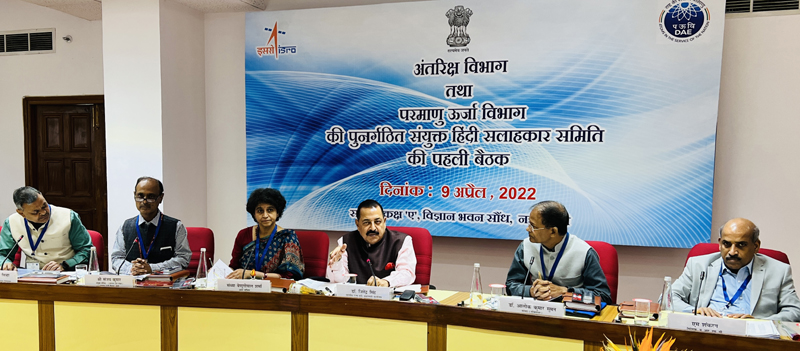
Excelsior Correspondent
NEW DELHI, Apr 9: Union Minister of State (Independent Charge) Science & Technology; Minister of State (Independent Charge) Earth Sciences; MoS PMO, Personnel, Public Grievances, Pensions, Atomic Energy and Space, Dr Jitendra Singh today said that India’s Nuclear Programme is for improving quality of life and not for causing harm to human life.
He was chairing the meeting of the reconstituted Joint Hindi Salahkar Samiti of Department of Atomic Energy and Department Space at Vigyan Bhawan in New Delhi.
Dr Jitendra Singh said, applications of nuclear energy and radiation have played a significant role in the field of electricity production, agriculture, medicine, health, food preservation, improved seeds varieties, water purification technologies, urban waste management technologies, industrial application of radioisotopes and radiation technologies particularly in petroleum industry. He, however, lamented that most of the societal applications of nuclear energy are not much known to the people.
The Minister also informed that Gamma Irradiation Technology is used for inhibition of sprouting in bulbs and tubes, insect disinfestation of cereals, pulses and grains, microbial decontamination (hygienization) of dry spices etc, for preservation/shelf life extension. He said, even during COVID pandemic, DAE came out with novel innovations like COVID BEEP, India’s first indigenous, cost effective, wireless physiological parameters monitoring system for COVID-19 patients.
Dr Jitendra Singh said that Tata Centre Mumbai, which is running a number of Cancer Hospitals across the country works under the aegis of the Department of Atomic Energy. He also informed that the Department of Atomic Energy and Tata Memorial Centre, with assistance from Tata Trust, is setting up additional units in Bihar, Assam and Uttarakhand.
Dr Jitendra Singh called upon the members of Committee and Department of Rajbhasha to take steps to popularise the achievements of Space and Nuclear Technology among the common through proper translation in Hindi and Vernacular languages through professional translators. He also laid stress on proper translation of Science textbooks and literature in Hindi and regional languages.
Dr Jitendra Singh said in the Department of Rajbhasha which is a part of Home Ministry, sea change is being witnessed and most of the official works in Central Ministries and Departments are being done in Hindi.
Dr Jitendra Singh said that Space Technology is being applied in diverse fields and sectors to bring “ease of living” for common man. He said that in the recent past Drone Technology is being used to bring a new revolution in the field of agriculture.
Dr Jitendra Singh was informed by members of the Advisory Committee that some of the MBBS syllabus will be taught in Hindi at Gandhi Medical College Bhopal from May this year and efforts are on to translate the entire curricula through medical and scientific professional experts.

